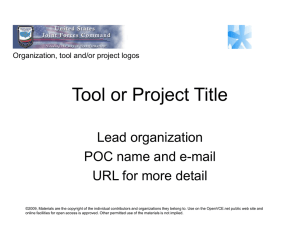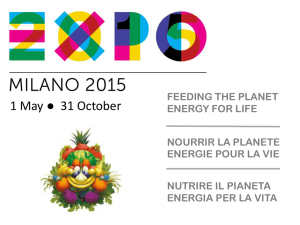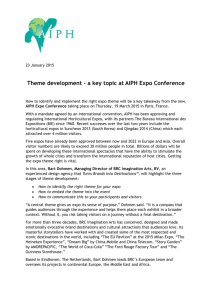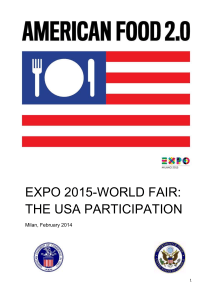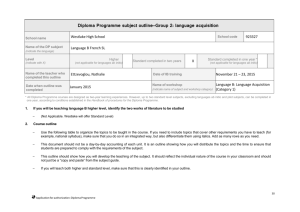fr375 * history of paris through its monuments and museums
advertisement
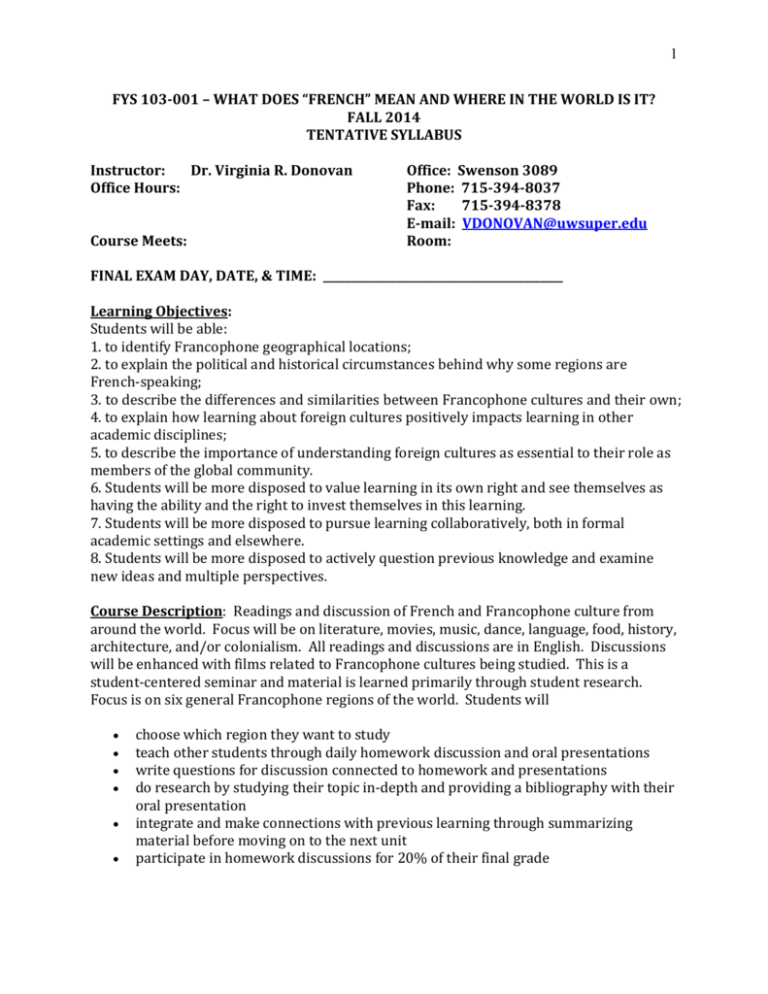
1 FYS 103-001 – WHAT DOES “FRENCH” MEAN AND WHERE IN THE WORLD IS IT? FALL 2014 TENTATIVE SYLLABUS Instructor: Dr. Virginia R. Donovan Office Hours: Course Meets: Office: Swenson 3089 Phone: 715-394-8037 Fax: 715-394-8378 E-mail: VDONOVAN@uwsuper.edu Room: FINAL EXAM DAY, DATE, & TIME: ___________________________________________ Learning Objectives: Students will be able: 1. to identify Francophone geographical locations; 2. to explain the political and historical circumstances behind why some regions are French-speaking; 3. to describe the differences and similarities between Francophone cultures and their own; 4. to explain how learning about foreign cultures positively impacts learning in other academic disciplines; 5. to describe the importance of understanding foreign cultures as essential to their role as members of the global community. 6. Students will be more disposed to value learning in its own right and see themselves as having the ability and the right to invest themselves in this learning. 7. Students will be more disposed to pursue learning collaboratively, both in formal academic settings and elsewhere. 8. Students will be more disposed to actively question previous knowledge and examine new ideas and multiple perspectives. Course Description: Readings and discussion of French and Francophone culture from around the world. Focus will be on literature, movies, music, dance, language, food, history, architecture, and/or colonialism. All readings and discussions are in English. Discussions will be enhanced with films related to Francophone cultures being studied. This is a student-centered seminar and material is learned primarily through student research. Focus is on six general Francophone regions of the world. Students will choose which region they want to study teach other students through daily homework discussion and oral presentations write questions for discussion connected to homework and presentations do research by studying their topic in-depth and providing a bibliography with their oral presentation integrate and make connections with previous learning through summarizing material before moving on to the next unit participate in homework discussions for 20% of their final grade 2 Required Materials: Steele, Ross. The French Way. 2nd Ed. New York: McGraw-Hill, 2006. Important dates: Monday, Sept. X – last day to add a class for the semester (using E-hive registration) Monday, Sept. X – last day to drop a class without the $20 late fee or “W” grade Monday, Dec. X – Friday, Dec. X– Final Examination period Course Requirements and Grading: Students will be evaluated by means of homework discussions, quizzes, 2 exams, an oral presentation, papers, daily participation, a class project, and a final exam. Grade breakdown: % of final grade Homework and Daily Participation in homework discussions 20% (200 pts) 4 Quizzes 60 points (15 points each) 6% 2 Exams 200 points (100 points each) 20% Oral Presentation 180 points 18% 4 Papers 160 points (40 points each) 16% Final Exam 100 points 10% Final Class Project 100 points (EXPO) 10% Grading Scale Percentages: 93-100% = A, 90-92% = A-; 87-89% = B+, 83-86% = B, 80-82% = B-; 77-79% = C+, 73-76% = C, 70-72% = C-; 67-69% = D+, 63-66% = D, 60-62% = D-; 0-59% = F Homework and Daily Participation: Homework will be assigned on a regular basis. Students will read assigned texts or research topics on the internet and discuss questions about the material in class. Nine (9) homework assignments will be collected randomly during the semester for grading. Participation in discussion contributes to the grade. Late homework will not be accepted. Students have the opportunity to earn 2 points per class session that they attend and in which they actively participate in discussions. Quizzes: There will be four (4) announced quizzes during the semester. Each quiz will be worth fifteen (15) points. There will be no make-up quizzes. Exams: Two (2) exams, part essay, will be given during the course of the semester over reading material, films, and class discussions. Each exam is worth 100 points. 3 Oral Presentation: Each student will prepare one creative oral presentation on a topic approved by the professor which is related to the course content. Presentations will be done in partners. Oral presentations are collaborative. Papers: Students will write four (4) two-page papers on the material being studied over the course of the semester. Late papers will not be accepted. Final Class Project (EXPO): The EXPO is a collaborative, hands-on class project, which demonstrates what students have learned, that is discussed in class, worked on in class, and presented in public near the end of the semester. Final Exam: The Final Exam is cumulative. Course Policies: Tardiness will reduce your participation grade for that class period by one (1) point. Any absence, due to family emergency, UW-Superior activities, or any valid reason must be accompanied by a written excuse. No exam or oral presentation can be made up unless the student contacts the professor BEFORE the exam or presentation (or at least within 24 hours afterward) and brings a written excuse. Students will turn off and stow all cell phones and electronic devices while class is in session—no exceptions. Texting and social networking in class are not permitted. During discussions, all students will treat each other with dignity when there are opposing viewpoints. Academic Honesty: Each student has an equal right to an environment that is conducive to the learning process. All students are expected to follow university policies including refraining from cheating, fabrication, plagiarism, interference, student incivility, etc NOTE: Copying text from a web site or from any other source without citing it for your work in IDS 103 What Does “French” Mean? constitutes Academic Misconduct. Student collaboration on papers in this class constitutes Academic Misconduct. Make use of the Writing Center: “The University of Wisconsin-Superior Writing Center, located in Swenson 1030, offers support to student writers in one-on-one sessions with peer consultants. Consultations are available free of charge to any UW-Superior student from any class in any discipline. Writing Center consultants help writers brainstorm, find topics, incorporate and document sources, organize drafts, develop revision strategies, and more. Both inperson and online consultations are available. When you visit the Center, take a copy of your assignment, any drafts or notes you may have, as well as any sources you’re working with. Have these items on hand for online consultations, too. Make appointments at http://uwsuper.mywconline.com. To find out when the Center is open and what other resources it offers, visit the Writing Center webpage at 4 http://www.uwsuper.edu/writingcenter.” University Policies: The University of Wisconsin-Superior is dedicated to a safe, supportive and nondiscriminatory learning environment. It is the responsibility of all undergraduate and graduate students to familiarize themselves with University policies regarding special accommodations, academic misconduct, religious beliefs accommodation, discrimination, and absence for University- sponsored events. For details of the Student Disciplinary Procedures: Academic Misconduct Disciplinary Process (Chapter 14) can be found at http://docs.legis.wisconsin.gov/code/admin_code/uws/14.pdf Student Nonacademic Disciplinary Procedures (UWS Chapter 17) can be found at http://docs.legis.wisconsin.gov/code/admin_code/uws/17.pdf Following is a link to the ”Syllabus Attachment” that delineates the University Policies: http://www.uwsuper.edu/deanfaculties/forms/upload/Revised-Syllabus-Attachmentfor-2012-2013-2.pdf Course Outline: Items on this course outline are subject to change. Pay attention in class or watch for communication from Dr. Donovan about any revisions to this schedule. Week 1, September 3 & 5 : Pre-test. Introduction to the concept of Francophonie. France: beginnings. Week 2, September 8 – 10 – 12: France: kings and Revolution. Week 3, September 15– 17 – 19: France: contemporary. Quiz #1. Week 4, September 22 – 24 – 26: Paris. Paper #1 due. Week 5, September 29, October 1 & 3: Oral presentation #1. Exam #1. Quebec and USA. Week 6, October 6 – 8 – 10: Quebec and USA. Oral presentation #2. Quiz #2. Week 7, October 13 – 15 – 17: French Caribbean. Oral presentation #3. Film Rue cases nègres. 5 Week 8, October 20 – 22 – 24: French Caribbean. Oral Presentation #4. Week 9, October 27 – 29 – 31: French Caribbean. Contemporary issues. Paper #2 due. Oral Presentation #5. Week 10, November 3 – 5 – 7: Africa. Begin talking about EXPO. Quiz #3. Week 11, November 10 – 12 – 14: Africa. Talk about EXPO. Oral Presentation #6. Exam #2. Week 12, November 17 – 19– 21: Talk about EXPO. Paper #3 due. SE Asia. Indochine. Week 13, November 24 & 26: SE Asia. Talk about and/or work on EXPO. Oral Presentation #7. Thanksgiving Break, November 27–28. No class. Week 14, December 1 – 3 – 5: Work on Expo. Expo—Thursday, December 4. (After EXPO on Friday, Dec. 5): French Polynesia. Week 15, December 8 – 10 – 12: French Polynesia. Paper #4 due. Oral Presentation #8. Quiz #4 Post-test. Evaluation of course. Final exam date, time, and place: ____________________________________________

